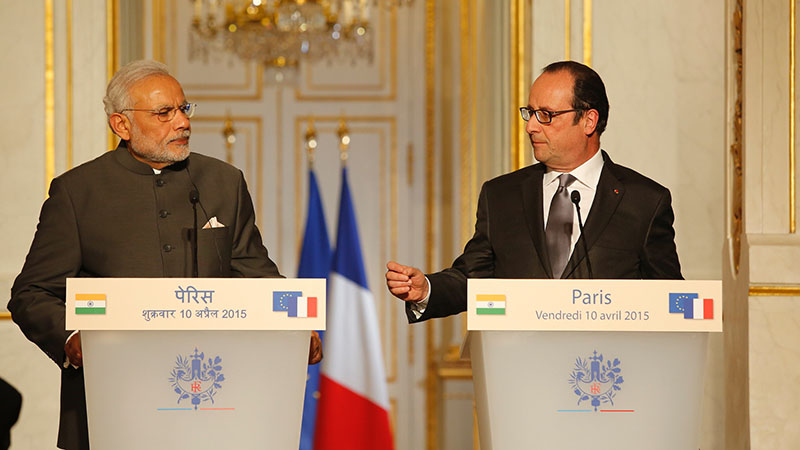India will formally approve the Paris climate deal on 2 October, prime minister Narendra Modi revealed on Sunday.
“India will ratify the decisions on October 2, the birth anniversary of Mahatma Gandhi,” Modi said in a speech to officials of the ruling BJP party in Kerala.
The world’s fourth largest emitter of greenhouse gases (counting the EU as a single bloc) and a fast-growing emerging economy, India’s move means it’s almost certain the UN’s new climate deal will come into force this year.
55 countries accounting for 55% of emissions need to ratify the carbon-cutting pact for it to become international law.
We welcome the news India will join the #ParisAgreement Oct 2. Congrats Prime Minister @narendramodi for your leadership to #ActOnClimate
— U.S. Ambassador Eric Garcetti (@USAmbIndia) September 25, 2016
So far 60 countries representing 48% of emissions have done so. EU climate commissioner Miguel Arias Canete told Climate Home last week Brussels would soon complete its paperwork and join in October.
Still, Modi’s announcement comes as a surprise given officials in Delhi had briefed the country was not prepared to fast-track approval – despite it just needing cabinet backing.
The u-turn represents a diplomatic failure for Delhi, which had hoped to secure access to better nuclear technology in exchange for backing Paris, wrote Business Standard correspondent Nitin Sethi.
And when Canete said the EU would sign up, “this promised to leave India isolated and embarrassed about the brinkmanship around climate talks as US President Obama looked on track to get the legacy gift without India’s help”.
Aviation pact looms
The world’s first global pact to tackle greenhouse gas emissions from the aviation sector is up for grabs as the UN’s International Civil Aviation Organisation meets in Montreal from 27 Sept – 7 October.
The EU28, US, China and United Arab Emirates are among 53 countries to signal support for proposals targeting an emissions limit to 2020 levels from 2021, although it will initially be voluntary.
India and Brazil are among those unlikely to join this year, but EU climate commissioner Miguel Arias Canete said talks were “not in a bad place”.
“We are making with the High Ambition Coalition a big outreach so more countries reduce the gap. Now 60-70% [of aviation emissions] will be covered,” he told Climate Home.
“The proposal on the table is not as ambitious as the EU would like… but the only time in my life we have had 100% [support for a UN deal] was in Paris.
“We are working actively and doing diplomatic outreach to convince as many civil aviation organisations as possible to come along.”
For background on the ICAO deal check out recent briefings on diplomatic support and potential costs.
Trump v Clinton
Six weeks till the US votes on its next president, the polls are tied between Hillary Clinton and Donald Trump.
The pair meet face-to-face for the first of three debates on Monday evening (it’s live on NBC), with six areas of policy selected by the hosts up for discussion.
Trump, who says climate change is a “hoax” and has backed a repeal of the Paris climate agreement, is opposed by most if not all US green groups.
Sure hope #debate moderators focus on key issues like email security and don't waste time on marginal issues like climate change
— Bill McKibben (@billmckibben) September 23, 2016
Clinton, as revealed last week by Climate Home, has toned down her climate and clean energy rhetoric since seeing off Bernie Sanders for the Democrat nomination, but does back policies to cut emissions and boost wind, solar use.
On Saturday the New York Times announced it was supporting her candidacy, branding Trump the “worst nominee put forward by a major party in modern American history”.
Clean power hearing
On Tuesday, a US Court of Appeals panel will hear oral challenges against Barack Obama’s flagship policy to limit emissions from carbon intensive power plants.
There’s some useful background in this blog from David Doniger, director of the climate and clean air program at the Washington DC-based NGO NRDC.
“The Supreme Court issued a ‘stay’ of Clean Power Plan implementation by a 5-4 vote, last February, just before the passing of Justice Antonin Scalia. The stay wasn’t a ruling on the legal merits of the Plan – only a decision to hold up implementation until the courts decide the challengers’ claims. That job now falls to the U.S. Court of Appeals in Washington. Ten judges will hear the case en banc (Chief Judge Garland has recused himself due to his nomination to the Supreme Court).”
Fossils and policy
This week Megan Darby will be reporting from Queens College, Oxford where a 2-day conference is taking place to assess how climate policy should target oil, gas and coal. For more details visit their website.
Legal implications of Paris
And on Tuesday I’ll be moderating an event from 5-7pm in London focused on the legal frameworks and bindingness of the Paris climate agreement.
Panellists include Maria Socorro Manguiat, head of national environmental law at the UN Environment Programme, Michael Burger, executive director, Sabin Center for Climate Change Law, Columbia Law School and Kate Cook, LRI chair and barrister at Matrix Chambers.
RSVP to [email protected] if you would like to attend.
